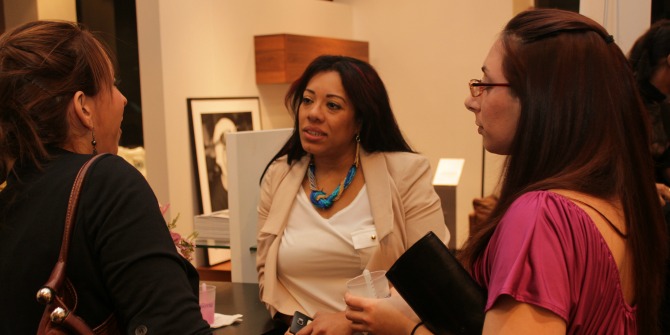
While people of colour have made significant gains in the workplace since US legislation made discrimination and segregation illegal, they continue to be underrepresented at executive levels in corporate America. This trend is particularly pervasive for black women who are fairly well represented at entry and middle-level management but make up only 1.2 percent of executive level officers of S&P 500 companies while being 12.7 percent of the US population.
Why should this matter to corporate leaders?
The answer is that black women represent an important and growing source of talent for corporate institutions. They represent the largest female minority group to receive bachelor’s degrees overall and in disciplines such as business, and computer and information science. The number of black women earning bachelor’s degrees increased 264 percent between 1977 and 2012 and those earning master’s degrees increased 353% during the same time period.
Additionally, black women by virtue of their biculturalism have developed sophisticated adaptive skills that are vital for leading and operating in complex global economic systems.
Given the educational accomplishments and leadership abilities of Black women, why are they not represented more in the C suite?
Racism. It has been cited as a critical factor in explaining under-representation of black women in senior management in corporate America. Contemporary racism is significantly different from blatant acts of discrimination. Modern racism, like racial micro-aggressions, is more likely to be covert, indirect, and ambiguous, thus creating challenges in identifying and acknowledging its occurrence. Racial micro-aggressions are “brief and commonplace daily, verbal, behavioral, and environmental indignities, whether intentional or unintentional, that communicate hostile, derogatory, or negative racial slights and insults to the target person or group.”
With the intersection of their marginalized identities of race and gender, black women are particularly vulnerable to negative stereotypes that create barriers to career advancement. Black women are often perceived as not having the intelligence, savvy and leadership abilities needed to excel in executive positions. To better understand experiences of racial micro-aggressions in the workplace and coping strategies of black women, I interviewed ten black women corporate leaders who had broken through the concrete ceiling to career advancement and demonstrated powerful resilience in the face of significant barriers.
What did I learn?
Despite the career success and the senior positions these women held in corporate America, they were not immune to persistent experiences and consequences of racial microaggressions. Black women’s overall competence, intellect and capabilities were often challenged and undermined in the workplace. There is the meta-communication of disbelief and surprise at black women’s intellect and achievements, by colleagues who often refer to their communication skills with statements like “you’re so articulate.” These perceptions not only contribute to creating negative work environments but also adversely influence performance evaluation processes, which drive promotion decisions. Several black women experienced frequent questioning of their authority and credibility. They described being excluded from social gatherings and work-related meetings and having limited access to sponsorship opportunities. Also, they described how their employers showcased a few successful leaders of colour, many of whom worked in support roles and not revenue generating positions, to tout their commitment to diversity.
To alleviate the psychological distress associated with racial micro-aggressions in the workplace, many black women engage in religious and spiritual practices and utilize support networks to feel less isolated and invalidated. Some engaged in shifting behaviors such as monitoring their speech and de-emphasizing cultural differences with white colleagues to combat negative stereotypes and limit being perceived as outsiders.
Despite the use of coping strategies, women in the study felt scrutinized and pressured to never make mistakes, in part, because of the burden to represent one’s group well. They worked twice as hard to disprove negative stereotypes. The pain of internalizing racial micro-aggressions can at times diminish self-confidence and work performance.
What can be done to address this issue?
The good news is that corporate leadership plays a critical role in shaping the culture of their institutions. Imagine the positive impact if managing diversity was a core leadership competency used to assess management’s performance and inform promotion and compensation decisions. It is important to have transparency, objectivity, and accountability in tracking how employees gain access to key career opportunities. Managers can take initiative to reach out to talented and high-potential black women and connect them to networks of influence and facilitate introductions to key stakeholders and sponsors.
Managers must recognize that racial micro-aggressions exist in the workplace and hold employees accountable for discriminatory behavior. Companies can create formal training opportunities to educate staff about how unconscious and conscious biases result in exclusionary practices in the workplace. While not an exhaustive list, these recommendations include three key ingredients for addressing subtle racism and creating more inclusion in the workplace: dialogue, action and accountability.
♣♣♣
Notes:
- This post is based on the paper Racial microaggression experiences and coping strategies of Black women in corporate leadership, co-authored by Aisha M. B. Holder, Margo A. Jackson and Joseph G. Ponterotto, in Qualitative Psychology, Vol 2(2), Aug 2015, 164-180.
- This post gives the views of its author, not the position of LSE Business Review or the London School of Economics.
- Featured image credit: Channing in The City CC-BY-SA-2.0 Photo of Aisha Holder by Alaric Campbell
 Aisha M.B. Holder is a Post-Doctoral Fellow at Columbia University Counseling and Psychological Services. Prior to pursuing a career in counseling psychology, she was a Vice President at JPMorgan Chase (JPMC) in the Corporate Training and Career Advancement Program divisions. Dr. Holder also served as a Human Resources Business Partner in the Consumer Banking and Investment Banking divisions of JPMC. She has co-authored articles in leading academic journals and a book chapter on workplace microaggressions in Talking about Structural Inequalities in Everyday Life: New Politics of Race in Groups, Organizations and Social Systems. Dr. Holder has also co-authored a chapter on culturally competent vocational assessments in the Handbook of Multicultural Assessment (3rd Ed.). She received her Ph.D. in counseling psychology from Fordham University, M.A. in psychological counseling from Teachers College, Columbia University, and graduated Phi Beta Kappa from Spelman College with a B.A. in psychology. Email: aishambholder@gmail.com
Aisha M.B. Holder is a Post-Doctoral Fellow at Columbia University Counseling and Psychological Services. Prior to pursuing a career in counseling psychology, she was a Vice President at JPMorgan Chase (JPMC) in the Corporate Training and Career Advancement Program divisions. Dr. Holder also served as a Human Resources Business Partner in the Consumer Banking and Investment Banking divisions of JPMC. She has co-authored articles in leading academic journals and a book chapter on workplace microaggressions in Talking about Structural Inequalities in Everyday Life: New Politics of Race in Groups, Organizations and Social Systems. Dr. Holder has also co-authored a chapter on culturally competent vocational assessments in the Handbook of Multicultural Assessment (3rd Ed.). She received her Ph.D. in counseling psychology from Fordham University, M.A. in psychological counseling from Teachers College, Columbia University, and graduated Phi Beta Kappa from Spelman College with a B.A. in psychology. Email: aishambholder@gmail.com






Well stated. Now that it’s out there we hope corporations will follow through and make the workforce less hostile to minorities in particular the same way sexual harassment has been identified and addressed. Thank you for the well covered article. It left no questions or myths only a ‘call out’ for action.
Great information and intriguing research! After reading the article I scanned the brief author bio I smiled harder … Soo very proud of my Spelman sister!
This article is so refreshing and on point.I have been in a supervisor position where as I had to prove why I was in that position. Although, I worked harder than my co-worker during evaluations my scores were always low.Which prevented salary increase or promotion to a different departmart. The every day stress became unbearable I resigned. I went full throttle to complete my degree in the health field. Upon graduating last year with my B.S and 20 plus year’s in the workplace and management position the door’s have not opened up. One hate to play the race/age discrimination card, but when I hear that many of my Caucasian colleagues have opportunity waiting it is disheartening. Although, I’m happy for thier opportunity African American women need the same opportunity to show our skills. I’m very impressed with this research information it is well needed and received. My question is now that evidence show the inequality in the upper level co-operation will they address these issues and bring down the walls ?
Thank you
Interesting article, spot on and not only in the US but the UK as well. Visibility is a concern, you can be in an organization with high performing teams and be invisible